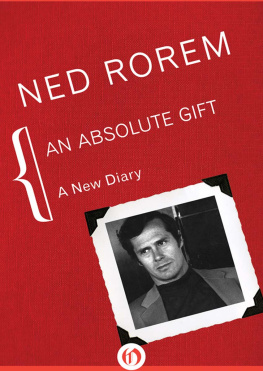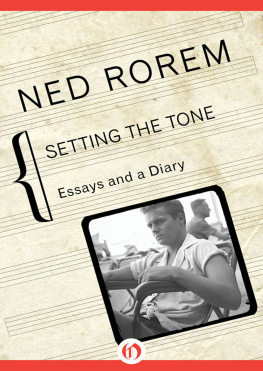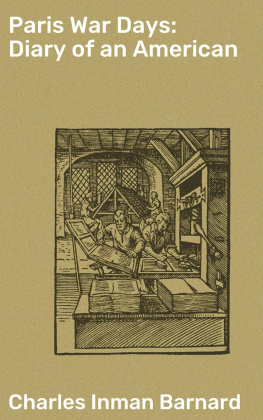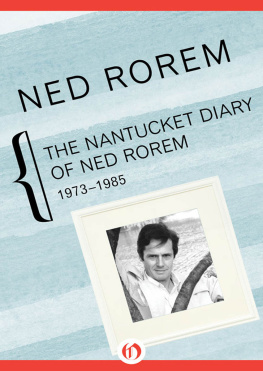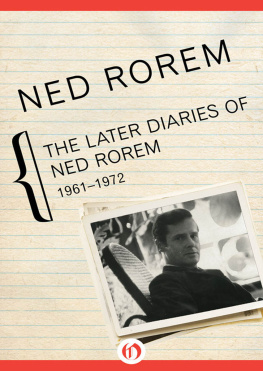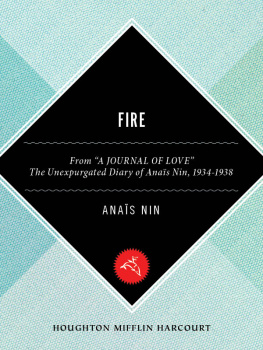Introduction
I am a composer who also writes. That settles our hash or, in the nature of the case, clarifies our ragout: the music comes first andRorem feels obliged to remind us, indeed sometimes rather sternlyneed not concern us further as readers.*
With regard to also writing, Rorems finest, or let me say his most lapidary, prose is to be found in certain essays (occasionally masquerading as journalism) in his six volumes of music criticism and chiefly in his memoir Knowing When to Stop. Diaries are something else, something much more gritty than lapidary, and of course it is Rorem who identifies the difference:
The distinguishing feature of a diary as opposed to a memoir is on-the-spot reaction, the writers truth as he feels it, not as he felt it. If that truth is no more truthful for being in the first person, it does contain the defining character of immediacy.
These first diaries of Ned Rorem, published thirty years ago and written during the previous decade, inaugurate a series which continue with The Later Diaries, The Nantucket Diary, and endlessly herald, in the manner of such things, the last diaries to which we are perhaps not entitled, but must, of course, covet. So intense, so distinct, and so reader-friendly have Rorems diaries provedto be that they have not escaped the homage of parody; the late Howard Moss (whose fastidious lyric poems Rorem oftenand quite as fastidiouslyset) published an Ultimate Diary in The New Yorker and even reprinted in his Instant Lives & More this hilarious excruciation of Rorems diaries while they were still coming out, as it were. My favorite entry from Mosss loving and lovable spoof, just in case you are a rolling stone, reads thus:
Thursday. Half the Opra-Comique seems to have fallen in love with me. I cannot stand any more importuning. Will go to Africa. How to break with C? Simone de Beauvoir, Simone Signoret, Simone Weil, and Simone Simon for drinks. They didnt get it!
The diarist proper, if that is the word, begins in 1951, quite oblivious of even the possibilities of parody; he is the classicaland classically profiledYoung Man from the Provinces in pursuit of his art and his identity. He releases a cascade of great names and self-lacerations that sets the tonethe temperament, to speak more musicallyof the world he will aspire to and (eventually) inhabit, blessed by the fortunes of talent, brains, reading, wit, and exceptional good looks. Exceptional for the comic consciousness of his narcissism as well; in 1951, the same year he reads Genet (he must be one of the first Americans to do so) and fails to discern the art of Our Lady of the Flowers (au fond, I am really a middle-class American), he also puts himself in the arrivistes pillory:
Famous last words of Ned Rorem, crushed by a truck, gnawed by the pox, stung by wasps, in dire pain: How do I look? Its harder to maintain a reputation for being pretty than for being a great artist.
Apparently within the first five years of diary-keeping, Rorem had arrived at Mae Wests Law, that a diary, properly kept, would in the dreaded long run keep him. By 1955, aboard the S. S. United States, he articulated the formal truth of his second mtier:
A diary has impact only through the accumulation of unlimited observations (of which many are obsessive and recurring), never through the development of themes (for then it would no longer be a diary). A diary necessarily has no form beyond the accidental one of improvisation; hence, though it cannot be a work of art (improvisation precludes this), perhaps it can be a masterpiece.
And if it can be, Rorem will work damn hard to make it so. Behind him, carefully studied, assimilated, and as often regurgitated, are the great examples of Henry James and Henry Millerthose icons of expatriation and alienated consciousnessand of his acknowledged Virgil through the inferno of le tout Paris, Virgil Thomson, with whom the diaries engage in a continuous agon from which Rorem is released only by a generous tribute he obliges himself to write for the dead master in 1989:
During the decades of our friendship (sometimes warm, sometimes cool) I never thought of him as less than this centurys most articulate musicologist and most persuasive opera-maker. Through his prose he convincingly evoked the sound of new musical pieces, and through his musical pieces he continues to evoke the visual spectacle of all our pasts.
Ahead of him, though, extends a darker prospect of ageing, dying, and what he calls the horror of the carnal hunt, as though the cultural hunt werent sufficiently atrocious. Sometimes the notations are grotesque in their self-engagement: Dior died. Im thirty-four; sometimes they are flavored by a perfectly crystallized Gallic salt: Claustrophobia is my fever and liquor my reward; and at all times there is the spontaneous concentration of a realized self, which will make these books so much more than the decorative (though hardly decorous) traces we may have been beguiled into supposing them.
Indeed, the real reason I want to introduce these reappearing diarieswhich certainly need no introductionis precisely their fierce focus upon what Baudelaire called the evaporation and concentration of the self, by which he meant, I believe, that systole and diastole of expressive being that enables us to achieve transformation. Rorem is the one American diarist of our century who achieves something of that cognitive sharpness, that linguistic energy and inventive power that we recognize in the soliloquies and asides of the great Shakespearean characters: like Falstaff and Iago, he overhears himself and thereby changes himself, so much so that sometimes he no longer recognizes himself (how harshly the later diaries will deride the young man who here tells us my philosophy was entirely based on the Quaker Church and American cinema). All of us nowadays proceed, as Harold Bloom puts it, endlessly talking to ourselves, endlessly overhearing what we say, then brooding and acting upon what we have learned. In Rorems often horrifying diaries, as in the Elizabethan dramatist, what we read is not so much the colloquy of the mind with itself as it is literatures reaction to what life has become. Of course there are felicities of local color to be found here (the worst surprise was discovering that grownups had all the weaknesses of children, and none of the strengths), and there are the entertainments of professional deformation (opera should be seen and not heard); but it is the respiring life of an overheard identity that is most grandly and graciously afforded in these diaries, the discourse of a man (that particularly symbolic man, a maker) changing and by his own words made aware that he is changing:
Today its June and Ive no summer plans, no money, nothing to work on, no love; too much liquor and leisure, too much sleep, and too much worried humidity all over the whole worlds sky. Im thirty-four and waiting: it isnt easy






